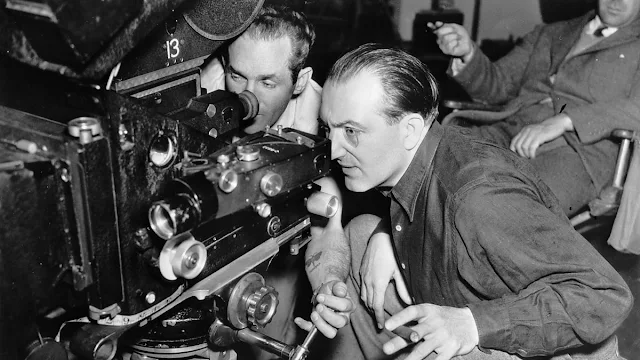Fritz Lang, a name synonymous with cinematic innovation, was a filmmaker whose work transcended time and genre to leave an indelible imprint on the world of cinema. Born in the twilight years of the 19th century in Vienna, Lang's journey from an aspiring painter to one of the most influential directors in film history is a tale of talent, tenacity, and a relentless quest for artistic excellence.
His films, ranging from the dystopian masterpiece "Metropolis" to the psychological thriller "M," have not only shaped the language of cinema but have also had a profound impact on the science fiction genre.
This essay aims to delve deep into the life and legacy of Fritz Lang, exploring his early years, his groundbreaking work in both German and American cinema, and the indelible influence he has left on filmmakers and audiences alike. Join us as we journey through the life of a man who could aptly be described as a true visionary of the silver screen.
Early Life
Friedrich Christian Anton "Fritz" Lang was born on December 5, 1890, in Vienna, Austria-Hungary (now Austria). He was the son of Anton Lang, an architect and construction company manager, and Pauline "Paula" Lang, who was born Jewish but converted to Roman Catholicism. Lang's early life was marked by a strict Catholic upbringing and a fascination with art and storytelling.
His father was a stern figure, while his mother nurtured his artistic inclinations, often taking him to operas and art exhibitions, which would later influence his cinematic style.
Education and Early Career
Lang initially studied civil engineering at the Technical University of Vienna but soon realized his true passion lay in the arts. He switched to study painting and eventually found his way into the world of theater and films. His early career was interrupted by World War I, where he served in the Austrian army and was wounded multiple times.
The war had a profound impact on Lang, shaping his views on human nature and society, which would later be reflected in his films.
Entry into Filmmaking
After the war, Lang moved to Berlin and began working in the German film industry. His directorial debut came in 1919 with "Halbblut" (The Half-Caste). However, it was the 1920s that would prove to be a defining decade for Lang. He became involved with the German Expressionist movement, which significantly influenced his visual style. His collaborations with his then-wife, Thea von Harbou, also played a crucial role in developing the narratives of his films.
Metropolis (1927)
One of Lang's most iconic films, "Metropolis," was released in 1927. This silent science fiction film was groundbreaking in many ways, from its special effects to its complex narrative. The film explores themes of industrialization and class struggle in a dystopian future. The character of Maria, the robot, became an iconic figure in science fiction cinema and can be seen as a precursor to other AI characters like HAL in "2001: A Space Odyssey." The film was also notable for its monumental sets and innovative special effects, including the use of miniatures and the Schüfftan process, a special effects technique that was revolutionary at the time.
M (1931)
Another milestone in Lang's career was "M," a film about a child murderer in Berlin. This was Lang's first sound film and is considered a masterpiece of world cinema. The film's use of sound was revolutionary, particularly the way Lang used it to build tension, such as the haunting whistle of "In the Hall of the Mountain King," which becomes synonymous with the murderer. The subject matter was both controversial and compelling, and the film was one of the first to delve into the psychology of a criminal mind.
Move to Hollywood
With the rise of the Nazi regime, Lang, whose mother was born Jewish, decided to leave Germany. He moved to the United States and continued his filmmaking career in Hollywood. His American films include "Fury" (1936), "You Only Live Once" (1937), and "The Big Heat" (1953). Lang faced challenges adapting to the Hollywood studio system but managed to maintain his unique style, often clashing with producers over creative control.
The Big Heat (1953)
In Hollywood, Lang adapted to the studio system but still managed to imprint his films with his unique style. "The Big Heat" is a prime example, a noir film that delves into corruption and revenge. The infamous scene where Lee Marvin's character disfigures Gloria Grahame's face with hot coffee is a shocking moment that exemplifies Lang's willingness to confront dark human impulses. The film also explores themes of corruption within the police force, a topic that remains relevant today.
Later Life and Legacy
Lang returned to Germany in the 1950s and made a few more films before retiring. He passed away on August 2, 1976, in Beverly Hills, California. His work has left an indelible mark on cinema, influencing a range of directors from Alfred Hitchcock to Ridley Scott. In his later years, Lang also took up teaching, sharing his wealth of knowledge with a new generation of filmmakers at institutions like the Film Academy Vienna.
Conclusion
Fritz Lang was not just a filmmaker; he was a visionary who pushed the boundaries of what cinema could achieve. From the dystopian landscapes of "Metropolis" to the psychological depths of "M," Lang's films are timeless classics that continue to captivate audiences and inspire filmmakers to this day. His influence extends beyond the silver screen; his work has been studied in academic circles and has inspired various forms of media, including graphic novels and video games.

















